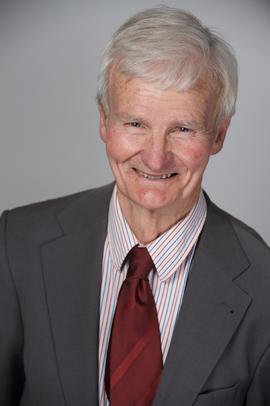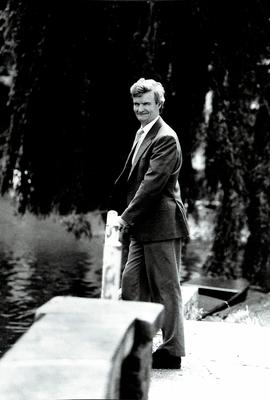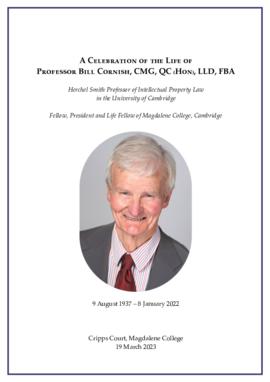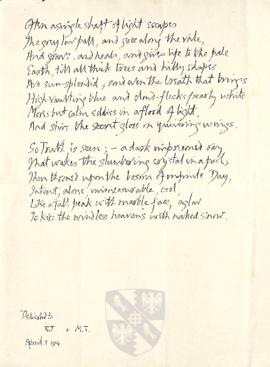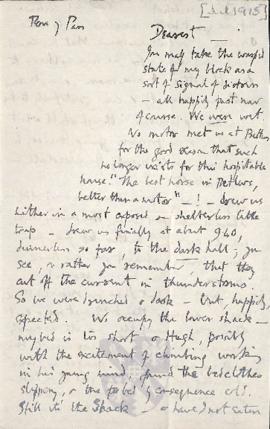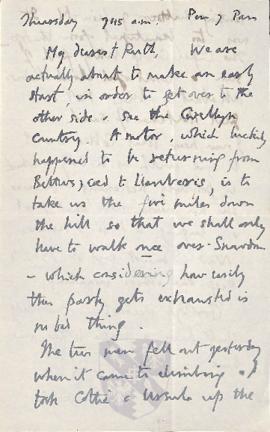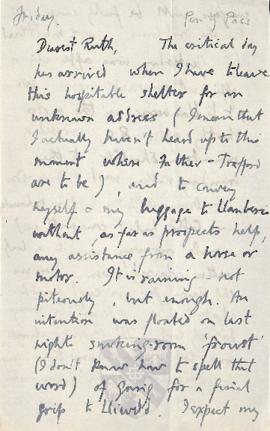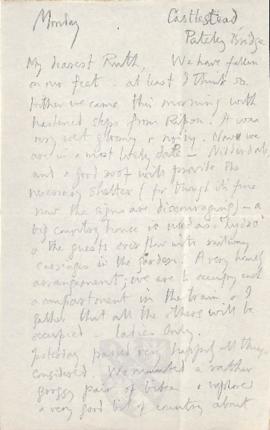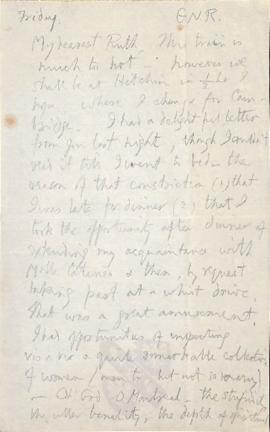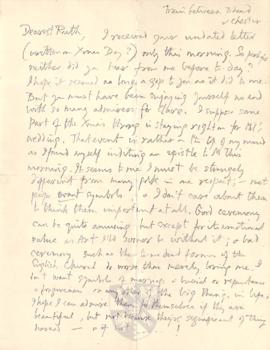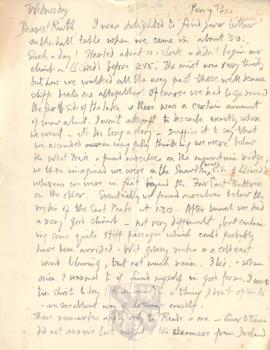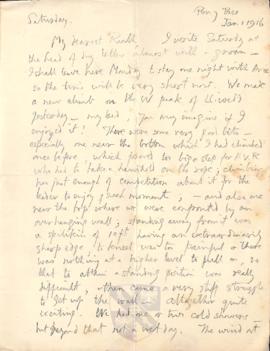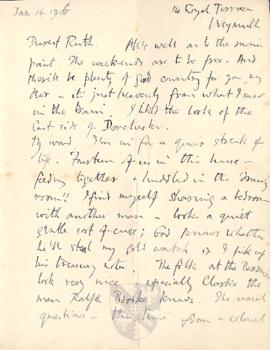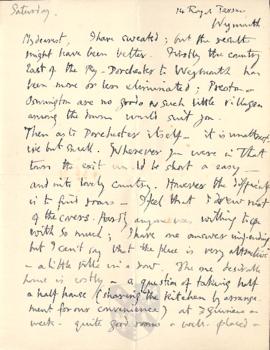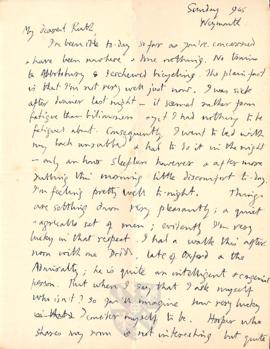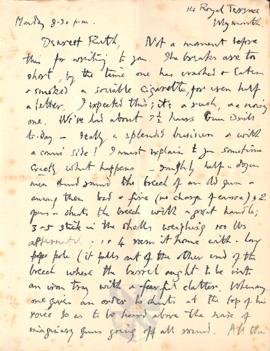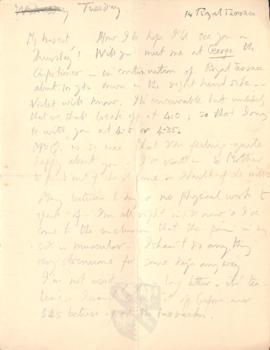Following WW2 Magdalene College set out to produce a comprehensive ‘War List and Roll of Honour’ to memorialise those members of the College who were lost in the war. A circular was sent out in 1947 “to every old member of the College matriculated since 1900” requesting information to be returned on a provided notecard “to include civilian national service as well as service in the armed forces, and to include all honours, awards, and decorations.”
Over the next few years, the individual notecards were returned to Magdalene College Office. The College Office processed and consolidated the returned notecards and later commemorated those who were lost on the World War Two memorial located in the Chapel. The individual notecards were preserved and are now in the Archive.
Transcript of the 1947 Circular
'War List and Roll of Honour. Since the publication of the second College Bulletin and War List in September 1941 the College Office has attempted to maintain similar records. The office has been handicapped, however, by shortage of staff and the absence of regular information, and these records are known to be incomplete and inaccurate. The College now contemplates the production of a comprehensive War List and Roll of Honour. In order to secure the greatest possible completeness and accuracy of detail, this circular is being sent to every old member of the College matriculated since 1900. The College would be grateful for the completion and return of the enclosed card, so that existing records may be corrected and brought up to date. It is intended to include civilian national service as well as service in the armed forces, and to include also all honours, awards and decorations. Where an old member of the College is known to have lost his life as a result of the war, this circular is being addressed to his parents; it is hoped that they will supply details of their son's war service. There may be cases, however, where the College has no record of death, and where in consequence the form of address used may have caused pain to widow or parents. To them the College desires to offer the most since apologies; every effort has been made to avoid such mistakes, and it is hoped that it will be understood that those which remain are due solely to the incompleteness of the available information. Some old members of the College, or their parents, who have visited Cambridge recently or maintained correspondence with the Master or one or the Fellows, may know that the information now requested has already been given; it has been thought, however, that any attempt at discrimination in the distribution of this circular would have been likely to lead to further errors, and that the probability of some duplication was preferable to the risk of any omission. War conditions have undoubtedly caused many unrecorded change of address: many of the circulars sent out before the compilation of earlier lists were returned by the Post Office marked 'not known'. Further, the replies now received will provide the material for a thorough revision of the College address-list. The largest possible number of replies is therefore desired. Any information likely to be of assistance towards this end will be greatly received: for instance, information from one old member of the College regarding another's change of address, or concerning men matriculated before 1900, to whom, before of their war service, a copy of this circular should have been sent.'
Replies
Although most returned the completed postcard containing details of war service, others also included additional material such as letters, funeral cards, obituaries, and official military papers e.g. copies of release orders.
Statistics Gained from the Returns
747 card replies
104 additional items e.g. letters etc
784 total names (7 duplicate names listed)
129 names on the WW2 memorial
115 names on WW2 memorial have additional information on the replies [see Excel box list]
14 names on WW2 memorial, no data in Excel box list
65 names on WW1 memorial, 1 name on Excel box list
705 served in WW2
6 served in WW1
5 served in both
336 British Army
9 British Indian Army
10 Indian Army
2 Government of India
75 Civilian Defence/Service
60 H.M. Government
112 RAF
60 Royal Navy
7 US Forces
1 Merchant Navy
1 Military Police
1 United Nations Relief
2 Conscientious Objectors
14 Prisoners of War
52 mentioned in dispatches
129 medals/awards won:
26 Military Cross [these were included on the memorial]
6 DFC [Distinguished Flying Cross]
6 DSC [Distinguished Service Cross given for service at sea]
1 KCB DSO [Knight Commander of the Order of the Bath and Distinguished Service Order awarded to Trafford Leigh-Mallory]
1 GM [George Medal awarded to David Alexander Methven]
Copy of a Royal Navy press release naming a new Testbed Ship XV Patrick Blackett
Copy of The New York Times reporting ‘Mallory & Irvine killed...', Sat 21 June 1924
Copies of photographs showing the outside of Mallory Court, a room inside Mallory Court, the stone memorial inscription on Mallory Court (a gift of A. C. Benson), a black and white slide of Mallory Court, and the brass memorial to George Mallory in the College's Chapel
Service sheet A Celebration of the Life of Professor Bill Cornish, held in Cripps Court 19 March 1999
Two photographs (electronic)
George Mallory was an undergraduate at Magdalene College between 1905 and 1908 and studied history under A. C. Benson. He was secretary and later Captain of the Boat Club, a member of the College's Kingsley Club, the University's Fabian Society, and the Marlowe Dramatic Club. He was the College's representative on the committee of the University's Women's Suffrage Association. His circle of friends included many members of the Bloomsbury Group including Lytton and James Strachey, Duncan Grant (who painted several nude studies of him 1912-1913) and Maynard Keynes.
After graduating he stayed in Cambridge for a year to write an essay which he later published as Boswell the Biographer (1912).
Sonnet written by George and dedicated to Ruth Turner and her sister Marjorie
Letter to Ruth Mallory written from Pen y Pass [no date]
Had arrived in Pen y Pass but instead of a car there was a little trap to meet them. They were expected but when they arrived the hall was dark as the current had been turned off due to a thunderstorm. They were staying in the lower shack and his bed was too short. Hugh was excited about the prospect of climbing. There was one other guest in the hotel, a man called O’Malley who would climb with them that day. Weather was clearing and they planned to go toward Tryfan. He had been sorry to leave her but was glad to be there.
Letter to Ruth Mallory, written from Pen y Pass on Thursday
They planned to go to see the Cwellyn country and would get a car to take them the five miles down the hill so they would only have to walk once over Snowdon. The two men fell out yesterday about climbing so he took Cottie and Ursula up the slanting Buttress of Lliwell which had a beautiful view from the top. Cottie was unable to join the party that day which was positively sickening as she was longing to see it.
Letter to Ruth Mallory, written from Pen y Pass on Friday
He was leaving Pen y Pass that day to travel to meet his father and Trafford, although he still hadn’t heard where they would be. He describes the previous days climbing which included walking over Mynedd Mawr which had a wonderful view of all the Snowdon group, stopping for a cup of tea in Snowdon village before walking over the flank of Snowdon and the top of Lliwedd getting back at 8.30pm. Ursula was a good walker and showed no signs of having been unduly exhausted. Was sorry Cottie had not been able to go with them. The group had a great deal of fun and good talk. Bertie Graham was a solid good natured Scot with a real sense of humour. He liked Owen but thought he was a professional pessimist and it was a pity he was so unfit. He hadn’t been reading the papers carefully but it was a comfort that the German losses must have been very big.
Letter to Ruth Mallory written from Castlestead, Pateley Bridge on Monday
They had left Ripon and were in Nidderdale staying in a railway carriage in the gardens of a country house which were used as an overflow for guests from the main house. He and his father had been cycling in the countryside around Ripon. His father often amused him and often shocked him by saying outrageous things but he never talked about family matters. He was a terrible snob.
He regrets not having seen Fountains Abbey again and but hoped to stay a couple of extra days after his father had left so that he could visit it along with Bolton Abbey and Skipton Castle. Trafford would probably get married on 19th and he would tell her the full story later. He was sitting near lots of wild raspberries which reminded him of Exmoor and says lots of little things remind him of Devonshire.
Letter to Ruth Mallory written from the train to Cambridge, Friday
He was on the train ½ hr from Hitchin where he would change for Cambridge. He had taken part in a whist drive which had been a great amusement. He had the opportunity to inspect a remarkable collection of women, and a few less men, commenting on the stupidity, utter banality, and depth of spiritual emptiness of middle class provincial England. He was pleased to win first prize of a hundred cigarettes.
He had enjoyed Wensleydale very much and had tried to take a photograph of it to show her as he thought they should go back there together. He describes the countryside, colours, buildings and views.
[He changes onto the Cambridge line and continues the letter]. He expected to feel like a stranger in Cambridge as it would have changed and be unfamiliar but Benson [his former tutor and the Master of Magdalene College, 1915-1925] and Gaselee would be there.
He had sent a pile of dirty clothes from Pately Bridge and asks her to have them washed. He would write again from Cambridge.
Letter to Ruth Mallory, written from the train between Birkenhead and Chester
He had received her undated letter which he assumes was written on Christmas Day. Assumes many of those there with her for Christmas would be staying on for Mildred’s marriage [Ruth’s sister]. He did not care about the symbols of marriage, burial, repentance or forgiveness. A good ceremony could be quite amusing but a bad one would do worse than merely loosing him.
He had quite a happy visit to Birkenhead and Avie and Harry had arrived after two burst tyres in the wind and rain in tremendous spirits. On Monday night he planned to stay at Mobberly and then on Tuesday he would be home with her. Suggests she go down whilst he was at Weymouth and stay nearby with his mother or a female friend for company and then he could see her at weekends.
Letter to Ruth Mallory written from Pen y Pass on Wednesday
He and Reade had spent the day climbing on Lliwedd. The mist was thick and there was snow around. He lead and was in quite good form. He had worn two shirts which was an excellent way of clothing himself.
Conor O’Brien did not arrive last night as the steamers from Ireland were not running in daylight for fear of submarines. He had arrived that morning after they had left for the day. The fourth member of the party couldn’t come at all.
Alan was more responsible and soberer. The constant need for control, thought and care had matured him. This meant he was less interesting than usual. He would stick at his job after the war and it was a shame he hadn’t gone to the Varsity. He would always be one of the nicest of people.
Is concerned about her health and asks if the reason for her high temperature was milk fever and whether Clare was now taking a bottle. Hopes she will enjoy her part in Mildred’s wedding and asks who will cook for her guests at the Holt. Hopes Mildred took his letter to her well as he feared it might have come across as rather a lecture. Asks her to date her letters.
Postscript - the clouds had lifted and the glass had gone up so they ought to have a fine day, rather windy and cold.
Letter to Ruth Mallory written from Pen y Pass
He was writing on Saturday and would be leaving on the following Monday to spend one night with Avie. They made a new climb on the west peak of Lliwedd under his lead which had some very good bits. H. V. R. [Herbert Reade] couldn’t manage a bit near the bottom without help. Climbing had just enough competition about it for the leader to enjoy such a moment. Wasn’t too wet during the climb but at that moment the wind was raging with savage gusts. Rain was coming down at intervals in torrents.
Her letter didn’t mention her health so he supposed she was better. Thought her idea to move in with Aunt Pattie was excellent. Apologises for forgetting to post his last letter to her in Chester so it would arrive later than intended.
Letter to Ruth Mallory written from Weymouth
Had seen Clarke and there was no hope of him going to Lydd immediately so he would be in Weymouth for about a month. She would be arriving the following day and he wouldn’t be back until about 4.30pm. Reminds her to change at Basingstoke if she comes by the 12.50. The house was in the block on the right near the Pavilion [he has drawn a sketch map showing the location of the house]. The landlady’s name was Mrs Plumbe.
Asks her to bring his white buckskin rubber shoes. Besides that the most important things were flowers and tea (Miss Jekyll’s kind).
Not quite so grey today, little rain in the morning but lots of mud.
Letter to Ruth Mallory written from 14 Royal Terrace, Weymouth
His weekends would be free and there was plenty of good country for her – he liked the looks of the east side of Dorchester.
There were 14 in the house all feeding together and 100 in the drawing room. He was sharing his bedroom with another man who looked a quiet, gentle sort. The folk at the Barracks looked very nice especially Clarke who knew Ralph Brooke [his brother in law]. Usual questions this time from a Colonel assuming he was a child of 17. There was a group of Irish from Dublin University who would probably be amusing.
Was glad he would have to search for rooms for her at the weekend as there was nothing else to do. Then there would be lectures, lectures, lectures and for fresh air gun drill.
He would write as soon as he had seen some places nearby - he liked the sound of Todpuddle, Tincleton and Little Bredy.
Letter to Ruth Mallory written from 14 Royal Terrace, Weymouth
Had been looking for rooms for her but hadn’t been successful yet. The country east of Dorchester to Weymouth had been eliminated. Preston and Osmington were no good. Dorchester was unattractive but small so she could get out to the countryside easily. There was Brockhampton which was in a lovely situation sloping down to the river. There was a cottage kept by a spinster of about 40 and she would need to bring bedding and order food from Dorchester. Asks what she thinks about it all and outlines other possibilities.
Letter to Ruth Mallory written from Weymouth
He had been sick and had a sore back which he had been rubbing and was feeling better. Things were settling down with a quiet, agreeable set of men. He had been for a walk with Dodds, late of Oxford and the Admiralty. Hooper, whom he shared a room with, was not interesting but unobjectionable and disposed to be friendly. They were to start at 8.30am next morning which was too early a start considering the number of men staying in the accommodation needing breakfast.
Wonders what she thought about his last letter [describes potential places for her to live in the area]. Would not be able to do anything more about it until next weekend.
Letter to Ruth Mallory written from 14 Royal Terrace, Weymouth
He had not a moment to write to her in breaks during the day. Had spent 3 ½ hours on gun drill. About 6 men stand around the breech of an old gun and load and fire it. When giving the order you had to shout to be heard over the noise of imaginary guns going off all round in the drill hall. The loads weighed 100lbs and he had been concerned for his back but it had survived so far. He listened to explanations without comment as it was part of his present mood not to do so. He was still of the opinion that it was a good Christian job. The lectures that day had been elementary.
She wasn’t to worry about the towels if they were hard to get at but he did want her to send the calling cards as he had to pay calls to a general, colonel and the mess.
Letter to Ruth Mallory written from 14 Royal Terrace, Weymouth
Looking forward to seeing her on Thursday and suggested meeting at George the Confectioners at the continuation of Royal Terrace. Mrs Q was so nice he was feeling happy about her [Ruth]. He had written to his mother to see if she would come but doubted she would. Had lectures all day and no physical work. He thought the pain in his side was muscular. This afternoon’s lecture had been given in the gun shed with him laying on a coil of rope.
He had made friends with an architect and climber called Courtnay. He had received a cheery letter from Graves who was safe for the present and also a letter from Raymond who was not safe and he didn’t expect him to survive the war.
Postscript - asks her to bring some tea as the mess would be glad of some.
